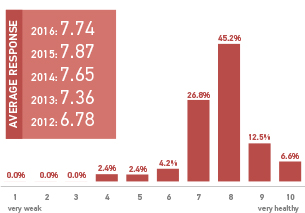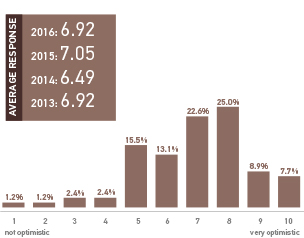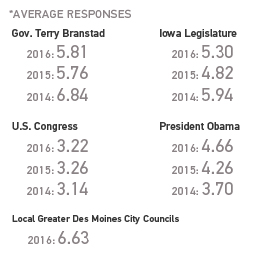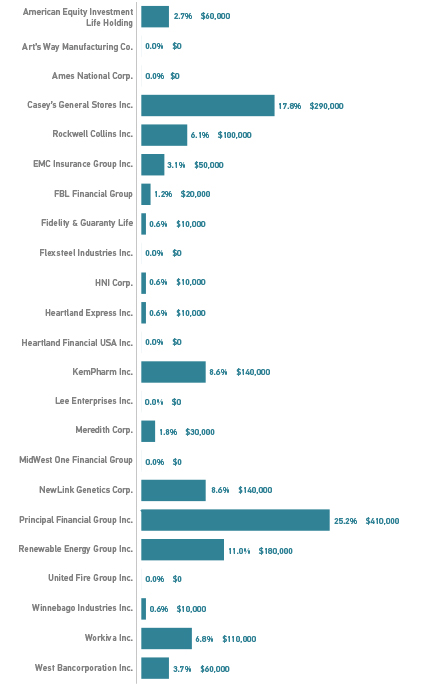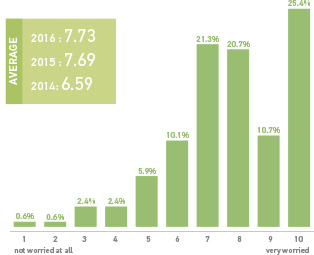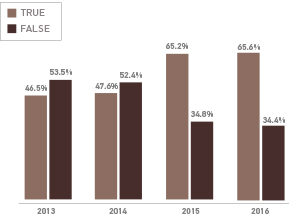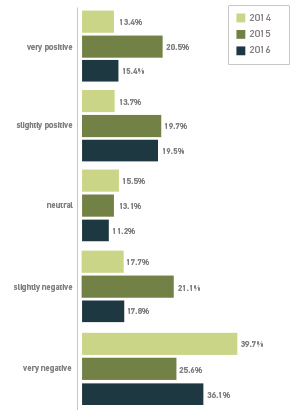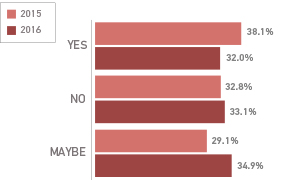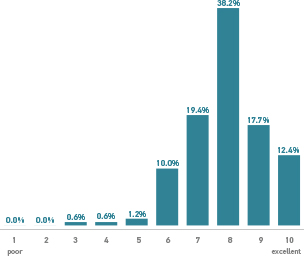Leaders Survey 2016

BUSINESS RECORD STAFF Nov 4, 2016 | 11:00 am
35 min read time
8,376 wordsAll Latest News, Business Record Insider, OpinionFor our annual Business Record Leaders Survey, we surveyed the Business Record audience on 16 business issues in order to capture the pulse of our readers.
Below we have the results of all the questions along with selected comments from our readers and from our guest voter Michael Sadler, an assistant vice president at CenturyLink, and analysis of each question from our senior staff writers.
The results are far from scientific, but the responses to our online survey provide a peek into the behaviors, beliefs and general mood of the community — and in some cases, how those moods have changed over time.
We couldn’t have done this without you, the leaders of our community. So, as always, a big thank you to the hundreds of leaders who participated in our survey again this year.
— Chris Conetzkey, editor of the Business Record
Table of Contents
Overall health of the central Iowa business community
Job market outlook
Driverless cars
Biggest issue facing Iowa businesses
How stressed are you feeling at work?
Effectiveness of our political leaders
Taking stock
Online data security
Long-term, health care reform
Affordable health care law
Former AIB College of Business campus
Des Moines Water Works lawsuit
Water quality initiative
Future of Prairie Meadows Racetrack & Casino
Overall quality of Greater Des Moines’ arts, culture and entertainment scene
New airport terminal
Rate the overall health of the central Iowa business community.
SUMMARY: The community once again is feeling overall very positive about the health of the Central Iowa business community. After four consecutive years of the average score increasing, the average score dropped for the first time since we began asking this question in 2012. However, the average rating of 7.74 dropped only by 0.13 and is still the second-highest rating since 2012. In analyzing the responses, any hesitations from full-blown optimism about the health of the community seem to stem from agriculture-related concerns, and perhaps even some worry about an overheating of the real estate and development market. But overall, I wouldn’t read too much into the drop, considering the sample size — most leaders were still feeling bullish on the economy. – Chris Conetzkey, editor
MICHAEL’S RESPONSE: 8 – “Central Iowa’s business community appears to hitting on all cylinders. Leaders are upbeat about recent positive results and bullish on the immediate future.”
READER COMMENTS:
Colin Van Kooten | Commodity Manager, Vermeer Corp. | Manufacturing & Logistics
4 – Agriculture and construction manufacturing dominates the region, and both are struggling right now.
Jennifer Canelos | Vice President, Marketing, Community State Bank | Banking & Finance
6 – We still have many issues to tackle to achieve greater health in our business community — e.g., regulation, taxes, fair pay for women, diversity, angel investors.
Jim Plagge | CEO, Bank Iowa | Banking & Finance
8 – Economic activity is brisk. I have some concerns that real estate development is nearing a bubble phase.
Genevieve Dean | Partner, AdelmanDean Group | Sales & Marketing
8 – Our businesses are continuing to grow along with our city. We are a city where businesses very much support one another.
Eric Lohmeier | President, NCP Inc. | Banking & Finance
8 – Central Iowa is firing full tilt. We are probably at or even exceeding full employment, and the financial, real estate (residential and commercial) and business services industries that drive the Central Iowa MSA are all working. If anything, I would say we are a bit too “Goldilocks” right now, especially on the commercial real estate side. I think we are beginning to see some cracks in that foundation in terms of additional supply in warehouse, office and multifamily. So 24 months out, this could be a very different environment.
Dan Culhane | President & CEO, Ames Chamber of Commerce & Economic Development | Economic Development
9 – Unemployment here is some of the lowest in the country, and our charitable nonprofits continue to be supported. Construction is up around the region. Things are generally good. That should not be misconstrued to mean everyone is doing well, as we have a sagging ag sector at this time.
SUMMARY: Overall, respondents were about as confident as last year, with the average response at 6.92 compared with 7.05 last year. Several respondents who rated on the optimistic side also lamented the state’s talent shortage, and a few others grumbled about the impact that government regulations have on their industry. – Joe Gardyasz, senior staff writer
MICHAEL’S RESPONSE: 7 – The telecommunications industry has some short-term challenges as we deal with the state of competition, particularly landline losses, as consumers change the way they communicate to an IP-enabled environment. Over the longer term, today’s substantial investments in broadband technologies will yield positive growth in an essential industry.
READER COMMENTS:
Creighton Cox | Business Development Leader, Olsson Associates | Real Estate & Development
7 – The job market is there; it’s finding the people to fill those jobs that has me worried.
Jessica Dunker | President and CEO, Iowa Restaurant Association | Retail & Business
5 – The restaurant industry is one of the last bastions of entrepreneurship where you can start as a dishwasher and end up an owner. That being said, I’ve never seen such an oppressive regulatory environment. It is strangling the dreams and opportunities of young restaurateur entrepreneurs.
Timothy Severson | Chief Administrative Officer, Nyemaster Goode P.C. | Law & Government
5 – Increasing cost pressures from clients and increasing competition from larger regional and national firms will affect the growth and profitability
of local firms.
Paul Drey | Managing Partner, Brick Gentry P.C. | Law & Government
7 – The legal community in the Greater Des Moines area does not see the extreme fluctuations that many large cities do. The legal job market should be good for qualified and experienced attorneys.
Ryan Peterson | President, Impact7G Inc. | Energy & Environment
8 – I don’t see our industry slowing down at all.
Matt Jacobson | Vice President, US Bank | Banking & Finance
8 – It’s good. High-paying jobs are available and seem to be increasing.
Rick Tollakson | President & CEO, Hubbell Realty Co.| Real Estate & Development
2 – We have seen major workforce shortages in our industry from construction professionals through the skilled trades. This is a major concern for our industry.
SUMMARY: Most respondents, 82 percent, think this will happen by 2030. The rest don’t. We’ve been hearing a lot about this lately, and the Iowa Department of Transportation already is working to beef up maps to help autonomous vehicles navigate Iowa as they fully hit the market. Our respondents are much more bullish on the driverless cars than last year, when 69 percent thought people would have the option by 2030. – Perry Beeman, senior staff writer
MICHAEL’S RESPONSE: Under – The technology for driverless cars exists today. The question will be “How quickly will our infrastructure be redesigned to accommodate the technology?” I would expect some of that work would be done prior to 2030.
Under – This will be a major disruption in the automotive industry, and there will be a fight to grab/keep market share. There is huge demand for this technology in the trucking industry and taxi services, where driverless cars could help solve the problem with the shortage of labor. There are also two major demographics, baby boomers and millennials, that are gravitating to urban living that will push for a solution to the stresses of living and commuting in these environments.
Jaclyn Hayek | Director of Business Development and Marketing, Bluestone Project Solutions | Real Estate & Development
Under – It has been projected driverless cars will be in the market for sale within five to seven years. In the market today, it is always a race to get the product out on the market and provide access to citizens.
Jessica Dunker | President and CEO, Iowa Restaurant Association | Retail & Business
Under – I can’t wait to have a driverless car. This is technology that many people, once they see it and experience it (and it becomes affordable), will likely love having.
Gunnar Olson | Communications manager, Des Moines Area MPO | Transportation
Under – Autonomous vehicles are already here and will continue to advance in sophistication.
Joseph Benesh | Senior Architect, Shive-Hattery Architects + Engineers | Real Estate & Development
Over – Progress of this type is slow. I would like to see it well before 2030, but I don’t know if 14 years is enough time to get states to accept this.
Rowena Crosbie | President, Tero International | HR & Education
Over – While common use of driverless cars may be possible by 2030, it’s hard to imagine them as a widely available option in Des Moines at that time.
William Knapp II | Chairman, Knapp Properties Inc | Real Estate & Development
Over – I don’t have much faith in the driverless car concept. It is a pipe dream, in my opinion.
Matthew McIver | Business Developer, Invision Architecture | Real Estate & Development
Over – Early tests are promising, but the decision-making algorithm will have a great deal of layers of hazards to offset and prioritize.
The biggest issue facing Iowa businesses right now is …
SUMMARY: Workforce! The overwhelming, and certainly not unexpected, answer from readers was of course workforce issues — attracting, retaining, developing and finding talented workers. More than half of the respondents referred to a workforce development-related issue. This, of course, has been a major theme of the past few years, especially given our state and region’s low unemployment. Other concerns in brief: health care costs, agriculture woes, environment issues and overregulation. In the comments, rather than overwhelming you with all workforce-related responses, I highlighted a few other leader concerns. – Chris Conetzkey, editor
MICHAEL’S RESPONSE: Workforce. Iowa businesses continue to be challenged with the ability to fill positions with qualified individuals. This challenge highlights the need for policymakers to make progress on immigration reform, as well as Pre-K through 12th-grade education. The recent news of falling test scores is troubling.
READER COMMENTS:
Connor Flynn | Chairman, Lessing Flynn | Sales & Marketing
A vision for the future beyond simply saving jobs. And a level playing field for small business and when it comes to incentivizing growth and entrepreneurial investment. We need more incubator centers for startups.
Jeff Damman | Vice President, MetaBank | Banking & Finance
Overregulation. Businesses spend way too much time and money complying with regulations rather than creating value for their clients and shareholders.
Andrea Nelson | Executive Director, ISU Extension and Outreach Polk County | HR & Education
Being welcoming, supportive to black-owned and other minority-owned businesses.
John Sorensen | President & CEO, Iowa Bankers Association | Banking & Finance
Over regulation.
Jessica Dunker | President and CEO, Iowa Restaurant Association | Retail & Business
Finding quality entry-level and skilled staff, particularly in retail, restaurants, manufacturing and other traditionally hourly paid positions.
Zachary Mannheimer| Vice President of Creative Place Making, Iowa Business Growth Co. | Economic Development
Focus on creating progressively unique concepts that set Central Iowa apart from the rest of the country.
Diane Glass | Owner, PineSpirit LLC | Health & Wellness
Investing in long-term programs to improve the environment.
Chris Sackett | Managing Partner, Brown Winick Law Firm | Law & Government
Labor and workforce needs. We will continue to be victims of our own successes in some ways — which means we need to be proactive in identifying strategies and finding solutions. This problem will not solve itself.
Robert Warren | Executive Director, Hoyt Sherman Place Foundation | Culture
Managing the rapid growth.
Becky DeVries | CEO, Midland Credit Union | Banking & Finance
Uncertainty of who will be the next president and what changes will he/she make.
Todd Kielkopf | President, Kielkopf Advisory Services | Tech & Innovation
Slow overall economic growth throughout the world’s major economies. This is partially due to demographic trends, U.S. household finances for both millennials (repay college debt) and boomers (need retirement savings), and excess production capacities in major industries. Organic profit growth is hard to achieve in this environment.
How stressed are you feeling at work?
SUMMARY: Average stress levels have been just north of the midpoint of the 1-10 scale over the past four years, and this year was no exception. The weighted average stress rating, which ticked upward to 5.54 last year, was down this year to 5.35, its lowest level since we began doing the survey in 2012. However, I noticed that very few people took the time to comment on their stress level, which may speak to how busy their day was. – Joe Gardyasz, senior staff writer
MICHAEL’S RESPONSE: 7 – In this “always on” environment, the separation between work and personal lives is no longer clear.
READER COMMENTS:
Lori Howe | Principal and Owner, Share Marketing | Sales & Marketing
5 – We have the capability of managing our lives to enjoy the work/life balance we seek. I’ve consciously determined the clients and work I take on drive my work satisfaction. I’ve become more selective over the years.
Chris Sackett | Managing Partner, Brown Winick Law Firm | Law & Government
5 – I have the positive kind of stress that comes with a desire to keep striving for more — more success for our clients, more success for our firm and our people, and more success for our community. Yes, this leads to stress, but it is also energizing and fulfilling.
Colin Van Kooten | Commodity Manager, Vermeer Corp. | Manufacturing & Logistics
3 – Would likely feel more stressed, but work for a great company that helps promote a healthy work/family balance.
Robin Heinemann | Executive Director, Iowa Shakespeare Experience | Culture
9 – The Arts and Cultural world is continually going through stressful times as if they were normal. Over time, this wears down capacity and growth.
Mike McCoy | Principal, Exponential LLC Consulting | Banking & Finance
3 – If I were still in my previous corporate environment, the stress level would be very high. Now, with more control over my schedule and choice as to what I choose to engage in, my stress level is below average!
Joseph Corfits | Chief Financial Officer, UnityPoint Health-Des Moines | Health & Wellness
8 – Very difficult time in the health care field, with the industry transition to value-based care and payment reductions, while at the same time having to pay premiums to find enough qualified staff.
Rate the effectiveness of our political leaders.
Local City Councils | Gov. Branstad | Iowa Legislature | U.S. Congress | President Obama
(Readers voted on a 1-10 scale; 1 being not effective at all, 10 being very effective.)
SUMMARY: We’re just going to come out and use this old saw: All politics is local. That certainly holds true for the Greater Des Moines business community. As a group, Greater Des Moines city councils scored 6.6 percent in our survey, topping Gov. Terry Branstad, at 5.8 percent, the Iowa Legislature at 5.3 percent, the U.S. Congress at 3.2 percent and President Barack Obama at nearly 4.7 percent. The president’s numbers have improved from 2014, 3.7 percent, and 2015, 4.26 percent. Congress has slipped from last year. The Iowa Legislature and Gov. Branstad are considered more effective this year than last. – Kent Darr, senior staff writer
MICHAEL’S RESPONSE: 10, 9, 9, 2, 2 – It is often said that “the closer you are to the people, the greater impact you will have.” Our local city councils prove that every day as they work on the things that are most important to their constituents.
READER COMMENTS:
Jaclyn Hayek | Director of Business Development and Marketing, Bluestone Project Solutions | Real Estate & Development
7, 9, 7, 3, 1 – National leadership has no leader to bring people together and collaborate. Obama does not represent business success as it is today; nor does he understand how business is run, managed or operated, making him a failure at knowing how to better our country, the people, its business and financial health. On a state level, I believe Branstad’s longevity stands on its own representing success. He understands the people of Iowa, our opportunities, our gaps and bettering all that is within. He is able to admit where improvements are needed, not brush them off as someone else’s fault. He is a proven leader.
Robert W. Holtzbauer | Partner, Denman & Company LLP | Banking & Finance
6, 6, 4, 3, 2 – No consensus builders, no leaders.
Jed Gammell | Vice President, Insurance and Risk Management, Lincoln Savings Bank | Insurance & Investments
8, 4, 3, 4, 6 – We’re very fortunate to have strong local leadership in our communities in Central Iowa. However, I’ve been consistently disappointed with our state and federal elected officials, from the oppositional nature of debate to inaction for fear of losing an election or being ostracized from portions of their parties. Both parties’ actions are governed not by wanting to accomplish great things, but by not losing the next election. I’ve also been embarrassed by the actions and words of many of our federally elected officials, especially as of late.
Anne Owens | Executive Director, Volunteer Center of Story County | Culture
8, 6, 6, 3, 7 – Compromise is a lost art and treated like a four letter word. Civility and professionalism would move us toward addressing needs and issues more than just spouting ideaology.
SUMMARY: Our respondents apparently have a penchant for a financial services titan, a fast fill of gasoline and food (pizza, maybe?), and the renewable fuels that could go in the gas tank. Principal Financial Group Inc. would get the $10,000 investment from 25 percent, Casey’s General Stores Inc. nearly 17.8 percent, and Renewable Energy Group Inc. 11 percent. Bio research was next in line, with nearly 8.6 percent of our respondents opting to invest in KemPharm Inc. as well as NewLink Genetics Corp. Principal and Casey’s also led the pack in 2015. Our readers also had some interesting observations about travel (Winnebago) and media (Meredith) stocks. – Kent Darr, senior staff writer
MICHAEL’S RESPONSE: Rockwell Collins Inc.
READER COMMENTS:
Becky DeVries | CEO, Midland Credit Union | Banking & Finance
Casey’s General Stores Inc. – Longevity; continued need for convenience stores in rural Iowa.
Joseph Corfits | Chief Financial Officer, UnityPoint Health-Des Moines | Health & Wellness
Principal Financial Group Inc. – A long history; stable company with good management.
Katie Patterson | CEO and Founder, Happy Medium | Sales & Marketing
Renewable Energy Group Inc. – I am a big believer in renewable energy, and I have seen Iowa already act as a pioneer in this industry. It will not only continue to be relevant, but as technology enhances the opportunity for growth, it will only expand in need and awareness.
Lori Howe | Principal and Owner, Share Marketing | Sales & Marketing
NewLink Genetics Corp. – Immunotherapy research and treatments are the focus of cancer research and will be for the foreseeable future. There will be a shift away from current chemotherapy and radiation treatments, if the promising research holds true. I am a Komen Iowa board member. Komen is investing in immunotherapy research, as well as research to better fight metastatic breast cancer.
Eric Lohmeier | President, NCP Inc. | Banking & Finance
Meredith Corp. – I like almost everything about this company, and there is probably a better than average chance after the last go-around that they could be acquired for a premium. If otherwise, nice dividend and a solid media portfolio.
Dan Corron | Sales & Leasing, Denny Elwell Co. | Real Estate & Development
Winnebago Industries Inc. – I keep hearing from baby boomers that they would like to travel and like the idea of having a recreational vehicle. I believe that with a mass retiring of this huge generation that we will see a big increase in sales of this nostalgic brand. Quality of life has always been something that they have preached to their children and will be something that they decide to have as a priority in their retirement. This stock may be at its peak 10 years from now, and that would be a good time to cash out.
SUMMARY: The nefarious side of the internet has business leaders worried, with 88 percent of our respondents saying their level of concern ranks between 6 and 10. A full quarter of our responses fell under No. 10. The anxiety level is on the rise. In 2015, cyber insecurity had an average score of 7.69, a full point higher than 2014. This year the average score was up a tad to 7.73. Two business leaders said they weren’t losing much sleep about attacks from the dark side of the web. – Kent Darr, senior staff writer
MICHAEL’S RESPONSE: 7 – Cybersecurity is of growing concern, but at the same time, companies that battle cybercrime are getting better at measuring risk and implementing effective responses.
READER COMMENTS:
Andrew Kleis | Partner, Insight Wealth Group | Banking & Finance
10 – Data security is a constant concern in our industry. If you’re not taking a vigilant approach, you’re just asking for trouble. And these days, trouble can mean more than a bad story or two — it can end a business.
Chris Sackett | Managing Partner, BrownWinick Law Firm | Law & Government
10 – Data security is one of the biggest threats facing both businesses and individuals, and the only solution is a constant combination of vigilance, education and technology upgrades to try and stay as close to even (you can’t get ahead) as you can to those who perpetrate these attacks. It’s a daunting situation.
Sherri Nielsen | President/CEO, Easter Seals Iowa | Health & Wellness
5 – Bad eggs figure out how to do bad things.
Jessica Dunker | President and CEO, Iowa Restaurant Association | Retail & Business
7 – It’s foolish not to worry about this. That being said, there are so many ways your security can be compromised that you have no way of figuring out how to protect yourself from, that you just have to count that the safeguards and consumer protections in place will ensure you don’t suffer a catastrophic loss.
Tom Flynn | President, Lessing-Flynn Advertising | Sales & Marketing
7 – I think larger businesses are more exposed because they have a bigger target on their backs, but it is definitely an issue for all business and individuals.
David Stroh | Principal, Wolin Mechanical Electrical Contractors | Real Estate & Development
5 – As long as we have windows in buildings, nothing is impenetrable. The same applies to the cyber world.
True or False: Long-term, health care reform will be a positive thing for businesses.
SUMMARY: Two-thirds of respondents said true, which is the same portion who agreed last year that health reform would be a long-term positive for businesses. However, several people who responded that way also wrote in their comments that changes are needed to make the present health care laws work and acknowledged that costs are spiraling upward. By comparison, in 2013 and 2014, the ratio of true-false responses were more a 50-50 split. – Joe Gardyasz, senior staff writer
MICHAEL’S RESPONSE: True – After personnel expenses, often health care is the No. 2 expense for a business. Employees need to be accountable for their health, but also prescription drug prices and the cost of care need to be controlled.
READER COMMENTS:
Matthew McIver | Business Developer, Invision Architecture | Real Estate & Development
True – It is far from complete or perfected, and the Iron Law of Unintended Consequences has been in full force, but if there can be common goodwill for actually taking care of the health of Americans rather than merely vainglorious political posturing (a big if), we might well actually do something good, nearly by accident, as it were.
Kristin Lowe | Executive Recruiter, Aureon | Economic Development
False – It’s just another form of welfare, and the rates continue to go up. It will never be affordable! It’s all a joke!
Joe Pietruszynski | Vice President, Hubbell Realty Co. | Real Estate & Development
False – You cannot trust politicians. They will not do what is efficient and effective. I have a daughter with special needs, and so far changes have hurt my family. I do not trust our government to fix the problem.
Matt Jacobson | Vice President, U.S. Bank | Banking & Finance
True – Obamacare is good in theory but was implemented incorrectly. Need a new system to stop increases in healthcare plus lower premiums. Competition is the key to this.
Haley Austin | Communications Analyst, Trilix | Tech & Innovation
True – If employees are healthy, business will be healthy.
Joseph Benesh | Senior Architect, Shive-Hattery Architects + Engineers | Real Estate & Development
True – There needs to be more pressure on insurance companies and more control from the consumer side in health care choices.
So far, the changes brought on by the affordable health care law have been…
SUMMARY: Nearly 55 percent responded that changes brought on by the Affordable Care Act have been negative, an increase from last year’s survey when about 47 percent of responses rated the changes as negative. In this year’s survey, the largest category of responses, 36 percent, pegged the ACA’s effects as “very negative.” Still, nearly 20 percent said the changes have been slightly positive, and more than 15 percent said they have been very positive. – Joe Gardyasz, senior staff writer
MICHAEL’S RESPONSE: Slightly negative – My self-employed friends speak often of increased premiums since the passage of ACA. There are positive components, but I believe the next Congress should start looking at revisions to the act.
READER COMMENTS:
Jim Kabel | CEO, Kabel Business Services | HR & Education
Very negative – Costs for everyone have gone up. Reporting required for employers over 50 employees is a big expense and does nothing to improve the quality of care for anyone. The penalties for not complying with the complicated reporting requirements are significant.
Jessica Dunker | President and CEO, Iowa Restaurant Association | Retail & Business
Very negative – It has made unaffordable the coverage for people who once had solid coverage and mandated purchase for people who still can’t afford it. Instead of offering a solution for those who didn’t have insurance, it’s mucked things up for almost everyone.
Eric Lohmeier | President, NCP Inc. | Banking & Finance
Neutral – Better access, but virtually no focus on driving down the cost curve. Pre-existing condition exclusions were an abomination, but public option will probably have to come into play soon in order to rationalize our country’s overall health care spend, and that must be tied to our payers’ (Medicare, etc.) ability to directly negotiate on price.
Nancy Robertson | Executive Director, Crisis Intervention Services | Health & Wellness
Very positive – As a small employer, it has been very beneficial for us. Before, our rates were greatly affected whenever one team member had health needs. Under the new plan, while we have seen increases in policy prices, they have not been astronomical.
Todd Kielkopf | President, Kielkopf Advisory Services | Tech & Innovation
Slightly positive – Decreases in part-time hours worked for any one employer now require two part-time jobs. That negative is offset by the lack of pre-existing conditions and greater aggregation of consumers that previously caused people to stay in employment that did not fully maximize their potential value to the overall economy.
Jaclyn Hayek | Director of Business Development and Marketing, Bluestone Project Solutions | Real Estate & Development
Very negative – It has caused individuals, small business and large businesses significant increases in providing health care for their employees, forcing the leadership or entrepreneurs to provide comprehensive packages and/or allow for earned raises or bonuses that many families need. This is not the right solution. It does not promote small-business growth, job growth or financial growth, and ultimately hurts health care accessibility for many/most.
SUMMARY: Sixty-four percent agreed that the former AIB College of Business campus should be the place for a joint regents campus, rather than developing a new downtown campus. Nearly 17 percent disagreed, favoring a new campus, and about 20 percent were unsure. In June, a consultant to the Iowa Board of Regents said surveys of business leaders and workers and a data analysis showed downtown Des Moines is the best choice for a joint campus. However, the former campus of AIB College of Business and sites in the western suburbs weren’t far behind in the ratings, the consultants said. – Joe Gardyasz, senior staff writer
MICHAEL’S RESPONSE: Yes – The former AIB campus is in a great location, close to the airport and downtown. It will be a better use of taxpayer dollars to repurpose existing infrastructure rather than building new.
READER COMMENTS:
Denise Rathman | Executive Director, National Association of Social Workers, Iowa Chapter | Health & Wellness
Yes – Come on, people, this is Des Moines — how many people are going to walk to a joint campus regardless of how close it is? And the AIB facility is lovely.
Dave Nelson | CEO, West Bank | Banking & Finance
I’m not sure – I don’t believe either should be selected if the location lacks the ability to be financially self-sufficient.
Cory W. Sharp | Intern Architect, FEH Design | Real Estate & Development
No – As seen in many other major cities, to truly capitalize on this opportunity, it needs to be located in a highly populated urban area.
Dan Culhane | President & CEO, Ames Chamber of Commerce & Economic Development | Economic Development
No – The current campus is unremarkable. If they are willing to level the buildings and redevelop the site, I do believe the location has advantages with a high level of visibility.
Joseph Benesh | Senior Architect, Shive-Hattery Architects + Engineers | Real Estate & Development
Yes – This campus is in a good location to serve those south of downtown and complement those offerings that are downtown.
Gunnar Olson | Communications Manager, Des Moines Area Metropolitan Planning Organization | Transportation
No – The whole point of an urban campus for the regent universities is to support the clustering of innovation in downtown Des Moines. This location misses the mark by 2.5 miles. “Innovations cluster in places like Silicon Valley because ideas cross corridors and streets more easily than continents and seas,” as one Harvard economist puts it. If ideas are going to cross the street in Des Moines, they need to be where pedestrians already are made to feel comfortable with sidewalks and crosswalks.
Jeff Damman | Vice President, MetaBank | Banking & Finance
Yes – The regents institutions all have an affinity to build more buildings. AIB is a great opportunity to use what we already have and make higher education available to so many more people in Central Iowa, especially nontraditional students. The AIB campus should be shared by the regents schools.
Joe Pietruszynski | Vice President, Hubbell Realty Co. | Real Estate & Development
Yes – Do not take more property off the tax roles.
MD Isley | Dean, Business & IT, DMACC | HR & Education
Yes – This type of collaboration has been tried before. Long-term commitment to these efforts is challenging due to changing leadership.
KaMeka Lowery | Director, WLC, United Way of Central Iowa | Economic Development
Yes – Why not? The facilities are already built and accessible.
Kent Henning | President, Grand View University | HR & Education
I’m not sure – The regents study did not establish a student demand for any programs that are not currently offered in the area by nearly 20 institutions. The study also did not establish a student desire to offer face-to-face classes in the downtown area. The study simply confirmed the desire of downtown developers to see a perceived amenity downtown. Post-traditional learners (working adults and grad students) are rapidly moving to online programs. The need for bricks and mortar to meet those needs is disappearing rapidly.
Nick Colletti | Vice President of Sales, Kuder Inc. | Sales & Marketing
No – The AIB property is a dump. Stop recycling old crap and expecting it to be great. Build something new that is environmentally efficient, technologically advanced and a dynamic place for learning that will attract students.
Rowena Crosbie | President, Tero International | HR & Education
No – The regents universities do not have a good track record of coming together in a common campus in Des Moines. Choice of location is secondary to developing a feasible plan that makes such a joint initiative likely to succeed.
SUMMARY: This question split the respondents evenly. Approximately 32 percent said yes, 33 percent no and 35 percent maybe. Many respondents said the lawsuit was unfortunate, but some saw it as a prime force behind meaningful debate on the key issues. Some would have preferred negotiations rather than legal action. A number held out hope for action, spurred by the threat of the lawsuit, at the Statehouse and beyond. – Perry Beeman, senior staff writer
MICHAEL’S RESPONSE: No – The lawsuit itself will not yield an end result of any consequence. I do believe that the lawsuit has sparked a needed conversation about the issue that will likely result in positive actions by policymakers.
READER COMMENTS:
Eric Lohmeier | President, NCP Inc. | Banking & Finance
Yes – Absolutely. The lawsuit triggered real debate about accountability for the irrevocable damage done to Iowa’s waterways over multiple generations. This is probably our biggest long-term risk to our major population centers in the state. Without real environmental stewardship of our natural resources, which includes accountability for protection on the largest pollution sources, we will not be a desirable place to live. It is hard to believe that this is even debatable, Iowans need immediate and significant control and accountability to stabilize and begin to reverse the tragedy of our polluted and dangerous waterways.
Ted Heying | Business Systems Analyst, Ruan Transportation | Transportation
Yes – Bill Stowe is a talented and capable individual, who has been allotted resources to build a team and make a compelling case for the widespread improvement of Iowa’s water quality and applicable agriculture practices.
Ben Currie | Assurance Supervisor, RSM US LLP | Banking & Finance
No – A lawsuit should be the last thing to bring change. There are plenty of organizations such as Pheasants Forever that can work with farmers and Des Moines Water Works to create a mutual benefit.
David Miller | Owner-Operator, Miller Family Farms | Energy & Environment
No – It is actually counterproductive, diverting resources from meaningful responses to water quality work.
William Knapp II | Board chairman, Knapp Properties Inc. | Real Estate & Development
Maybe – Only if it forces/encourages the governor and Legislature to adopt the sales tax option for water quality and recreation.
Timothy Severson | Chief Administrative Officer, Nyemaster Goode P.C. | Law & Government
Maybe – Maybe the lawsuit will increase the awareness of the pollution issue and will be addressed voluntarily instead of mandated and litigated by the courts.
SUMMARY: More than than half of respondents, 52 percent, don’t think lawmakers and the governor will agree on a major new water quality initiative and the long-sought permanent funding. The other 48 percent answered “true.” This has been one of the most divisive issues for decades, and one that lawmakers haven’t been eager to address. Part of that has been the complexity of trying to fix a problem that comes from multiple sources. Pressure from politically powerful agricultural groups has come into play, too. As the tab for nitrate treatment at water plants has increased and fun-seekers have tired of murky water and bacteria warnings, voters have turned up the heat on lawmakers. – Perry Beeman, senior staff writer
MICHAEL’S RESPONSE: True – Gov. Branstad proposed legislation during the most recent legislative session to address water quality. Though not perfect, components of that proposal hold merit, and I believe with further bipartisan work, a water quality solution will be reached.
READER COMMENTS:
Drew Kamp | Director of Government Relations, Ames Chamber of Commerce | Economic Development
True – It will be difficult with decreasing revenues to make a new and sizable appropriation, but I think they will find a way to do so.
Larry Carl | Executive director, Iowa Dental Association | Health & Wellness
True – No election coming for two years.
Lori Howe | Principal and owner, Share Marketing | Sales & Marketing
True – Because I’m an eternal optimist. And, there is more pressure to get something done.
Lisa Cassady | Public relations manager, Iowa Corn | Law & Government
True – Long-term funding is needed to improve the state’s water quality. We all must contribute to do so, including agriculture, businesses, cities and taxpayers. We all have a part to play in the quality of our water; therefore we should all contribute.
Mark Courter | Agent/owner, Mark Courter Insurance | Insurance & Investments
False – Our government doesn’t work that quickly, and we can’t get enough people to be nonpartisan to make this work in a quick manner.
Teree Caldwell-Johnson | CEO, Oakridge Neighborhood | Culture
False – Too many competing demands. The previous discussion focused on taking a component of the statewide penny for education to create the funding stream for water quality. Education is already underfunded, and to think that “robbing Peter to pay Paul” is a solution is not good public policy.
Ryan Smith | Marketing director, Better Business Bureau | Retail & Business
False – Although discussions will move in the right direction, lobbying groups will make it very difficult to pass meaningful legislation.
SUMMARY: In the early days of Prairie Meadows Racetrack and Casino, the Internal Revenue Service didn’t have much issue with the operation’s status as a nonprofit social welfare organization. It operated under the oversight of the Polk County Board of Supervisors, and a large chunk of its revenues supported worthy causes, and they still do. But things have changed a little over the years. Prairie Meadows operates largely independently of the county; its revenues, bolstered by slot machines and a bustling events center and hotel, are staggering. The IRS has taken notice and is threatening to pull the nonprofit designation. That could threaten millions of dollars that local charities and property owner Polk County rely on. The controversy generated slightly more than a ho-hum in our survey, with an average response of 5.6. A little less than 11 percent of respondents were “very concerned” about the loss of funds, and at least one person blamed the dust-up on bad management. On the other end of the scale, a little more than 17 percent of respondents were not concerned at all that Prairie Meadows could start paying a hefty tax bill. – Kent Darr, senior staff writer
MICHAEL’S RESPONSE: 9 – Prairie Meadows has been a great community partner. If the IRS decision comes down in a way that eliminates or significantly limits Prairie Meadows’ ability to function as it has, Central Iowa will be hard-pressed to replace the contributions that Prairie meadows brings year after year.
READER COMMENTS:
Connor Flynn | Chairman, Lessing Flynn | Sales & Marketing
9 – Poor leadership. Lack of oversight. Excessive compensation packages for top management. And the huge failure of its horse racing operations (attendance, income, etc.). It’s pretty obvious Prairie Meadows is bankrolling Iowa’s horse racing industry by draining millions of casino dollars to support the purses. And it’s obvious they can’t continue to operate that way. Frankly, I can’t believe nothing has changed since the feds challenged its nonprofit status. (Doesn’t look like Prairie Meadows is doing anything.)
H.A. Gross | Sales Manager, Plaza Printers | Sales & Marketing
3 – The only people losing on this are the people that Prairie Meadows helped with grants.
Dave Nelson | CEO, West Bank | Banking & Finance
1 – We should all always be curious and very interested in why some businesses are able to get the rest of us to pay their taxes for them.
Creighton Cox | Business Development Leader, Olsson Associates | Real Estate & Development
10 – Prairie Meadows is a key benefactor to Polk County in both helping to lower property taxes and assisting so many wonderful nonprofit organizations. I would hate to see the IRS take the nonprofit status away and hurt our community.
David J. Fisher | Chairman, D.J. Fisher LLC | Transportation
6 – The casino will exist and prosper but will be paying taxes.
Emily Roush-Bobolz | Marketing Associate, Your Clear Next Step | Sales & Marketing
10 – In addition to my full-time position, I hold a part-time position as the marketing consultant for the Warren County Philanthropic Partnership (an affiliate of the Community Foundation of Greater Des Moines). Prairie Meadows losing its nonprofit status would have a large impact on communities, such as Warren County, that receive money from Prairie Meadows. If they lose that status, our community foundation would lose funding and basically be nonexistent. Dozens of other nonprofit organizations in my county rely on that money for items they need, such as body cameras for the Carlisle Police Department, equipment for area fire departments and more.
Jeff Pigott | Senior Vice President for Sales, Provider Healthcare, Briggs Healthcare | Health & Wellness
10 – Polk county has a lot riding on this. The fact that they moved ahead on a convention center hotel that no private business was willing to build and financing this with Prairie Meadows receipts is scary.
Lori Howe | Principal and Owner, Share Marketing | Sales & Marketing
7 – I believe Prairie Meadows needs to be more accountable. Yet, its support for nonprofits and community initiatives would be greatly missed if Prairie Meadows loses its nonprofit status.
Paul Drey | Managing Partner, Brick Gentry P.C. | Law & Government
7 – Charities and nonprofits that have benefited from Prairie Meadows’ success may face some very difficult times if this potential funding source is lost.
Ryan Peterson | President, Impact7G Inc. | Energy & Environment
5 – I understand why the IRS is doing it, but it is definitely unfortunate, as they donate to a lot of great causes around the metro.
Sharon Goldford | Executive Director, Jewish Federation of Greater Des Moines | HR & Education
6 – They will figure it out. If the nonprofit status is not upheld, they can make changes to maintain it.
Teree Caldwell-Johnson | CEO, Oakridge Neighborhood | Culture
10 – There is much community benefit gained from the various investments Prairie Meadows makes in our community. I do not believe that existing philanthropic structures will be able to “make up the difference” that may be lost should Prairie Meadows lose it nonprofit status. The trickle-down effect is significant, and the impact significant and measureable.
Todd Kielkopf | President, Kielkopf Advisory Services | Tech & Innovation
3 – There will be policy-level impacts for financial strategies that relied on their nonprofit tax status. That should be a wake-up call that funding of ongoing costs needs to be backed by tax sources, not peripheral income from sources like gambling. That kind of funding is best allocated for one-time projects that provide a return on investment to society. Otherwise the true costs of public services get subsidized and misallocated.
Paul Bishop | President and CEO, Association of Boards of Certification | Energy & Environment
2 – As a community, we will fill the void should Prairie Meadows lose its appeal.
SUMMARY: The largest share of respondents, 38 percent, rated the overall quality an 8, followed by 19 percent at 7 and 18 percent at 9. The weighted average was just shy of an 8. When we asked for big ideas to increase the cultural offerings, they included building on the hip-hop scene, new art attractions, a DuPont Circle-style gathering spot, a monorail through the metro, and a network of screens that promote events and sell tickets to them. The ideas touched on the arts, history, transportation and entertainment. – Perry Beeman, senior staff writer
MICHAEL’S RESPONSE: 7 – We should keep building upon the hip-hop presence and offerings in Central Iowa. There is a core group doing some good work, but I see lots of potential for upward growth in not only the number of events, but also the development of local talent and attraction of national groups.
READER COMMENTS:
Andy Schryver | Director of Membership Services, Better Business Bureau | Law & Government
Des Moines Culture Week: Spend one week really highlighting the different art options here in the city. Each night is a different event/place — art museums, sculpture park, architecture, Botanical Center, sidewalk art contest, concerts, dances, etc. Have a contest where each person gets a stamp at each event.
Tom Flynn | President, Lessing-Flynn Advertising | Sales & Marketing
So much of our state and city has a connection with agriculture and food. It would be interesting to develop an event like Austin, Texas’ SXSW (South by Southwest) event — but leveraging the food, agriculture, biotechnology industry to expose people to our city and highlight the importance of these industries.
Caroline Jones | Consultant, Caroline Jones Social Media Development | Sales & Marketing
A monorail system to connect urban and suburban dwellers to events and offerings across the metro.
Daniel McCraine | Founder, McCraine Associates | Retail & Business
A multicultural museum highlighting how various cultures have contributed to and shaped Des Moines, from Native Americans to present immigrants.
Jennifer Canelos | Vice President, Marketing, Community State Bank | Banking & Finance
An Iowa cultural center that showcases the architecture, history, art and cultures of Iowa all in one place. More affordable places to hold business meetings and events.
Paul Drey | Managing Partner, Brick Gentry P.C. | Law & Government
I think it would be great if downtown Des Moines could create and support a theater district.
Jessica Dunker | President and CEO, Iowa Restaurant Association | Retail & Business
Even more bike trails! They are driving tourism. More free, low-key outdoor concerts featuring local artists.
Connor Flynn | Chairman, Lessing Flynn | Sales & Marketing
Ramp up a massive Riverwalk concept that ties all of the current cultural and entertainment venues together (I-Cubs, Court Avenue, Wells Fargo Arena, World Food Prize, plus entertainment venues like Brenton Skating Plaza, river dining, Botanical Center, the amphitheater) with an environment that incentivizes increased investment in one of Des Moines’ greatest assets.
Cory W. Sharp | Intern architect, FEH Design | Real Estate & Development
Make Walnut Street pedestrian-only and allow this avenue to be robust with cultural and entertainment offerings.
Zachary Mannheimer | Vice President of Creative Place Making, Iowa Business Growth Co. | Economic Development
Many people will rate this high, as the number of offerings is growing, and that’s true. However, to create a real industry that is competitive outside of Iowa, we need to nurture, invest in and grow our local artists. That is not happening in any major way. Instead we are nurturing organizations. That’s a great thing, but if it comes at the expense of individual artists, we are shooting ourselves in the foot. Beyond better public transportation, investing in our homegrown talent so that it is known outside of Iowa is the best thing we can do to grow our economy long term.
Matthew McIver | Business Developer, Invision Architecture | Real Estate & Development
We need festivals other than music festivals — theater, comedy, other. We need to grow a diversity of the arts, and support them better.
MD Isley | Dean, Business & IT, DMACC | HR & Education
Distribute the hotel/motel tax revenue more evenly among all organizations, not just the largest, most powerful.
Genevieve Dean | Partner, AdelmanDean Group | Sales & Marketing
Utilize Cowles Common more, as we’ve been doing with events such as the Iowa vs. Iowa State game viewing, NCAA party, possibly a Winter Wonderland event, etc.
Denise Rathman | Executive Director, National Association of Social Workers Iowa Chapter | Health & Wellness
What I miss most about living in a big city is having places where people gather naturally, hang out, relax, have a good time and enjoy the weather and each other. We just don’t seem to have that here in Des Moines. (Examples: Jackson Square in New Orleans, DuPont Circle in Washington, D.C.)
Ryan Smith | Marketing Director, Better Business Bureau Serving Greater Iowa, Quad Cities and Siouxland | Retail & Business
Create a music/arts “strip” or “district” with a concentrated variety of music, art and culture.
Robin Heinemann | Executive Director, The Iowa Shakespeare Experien


